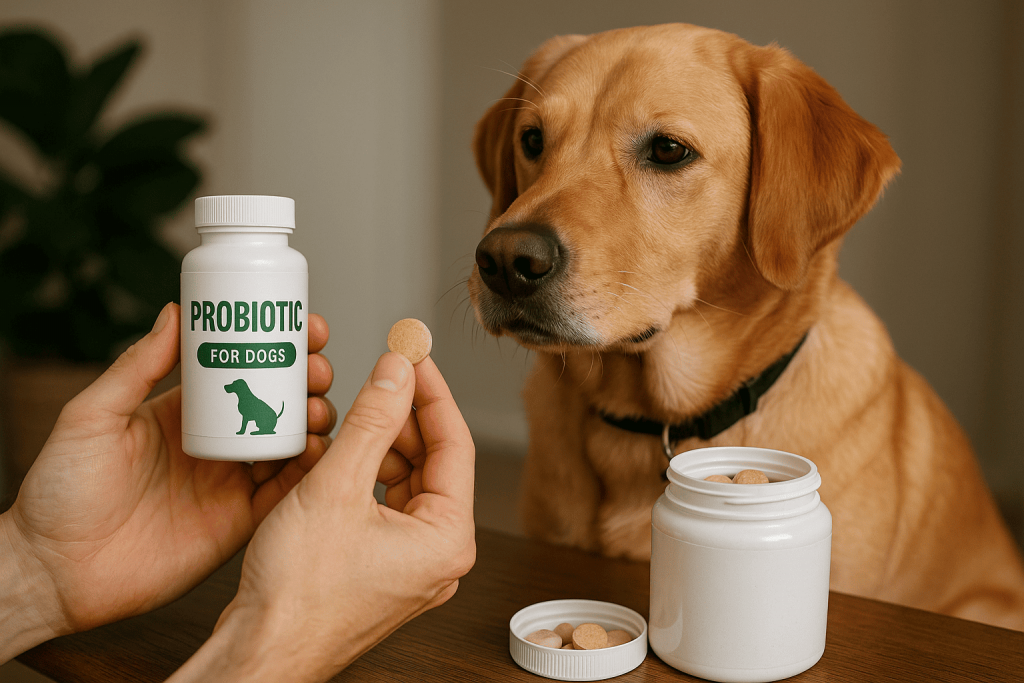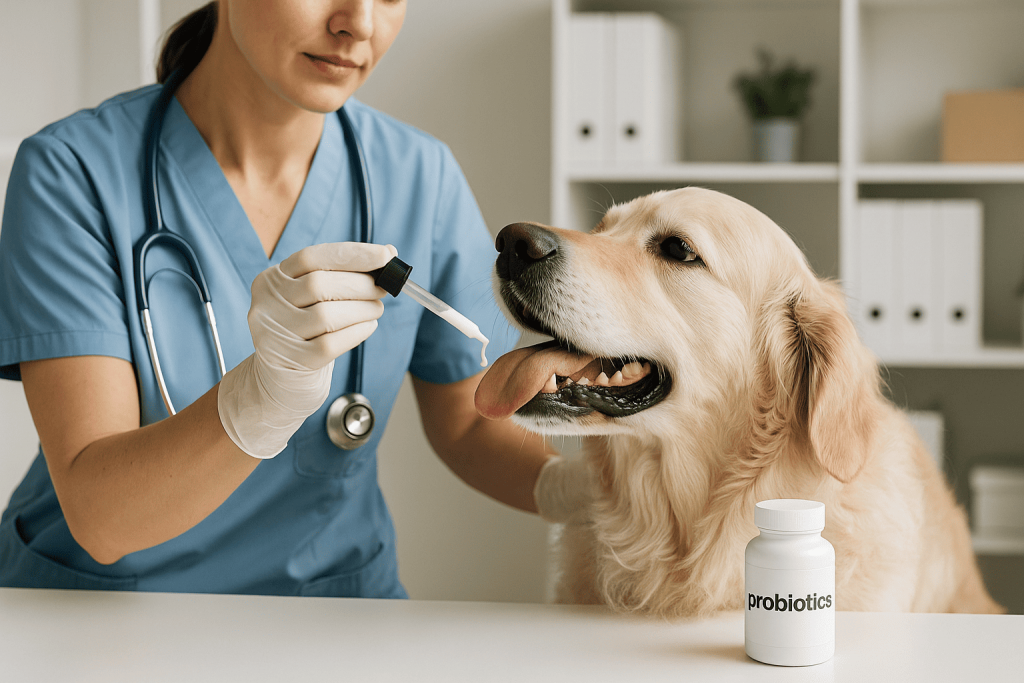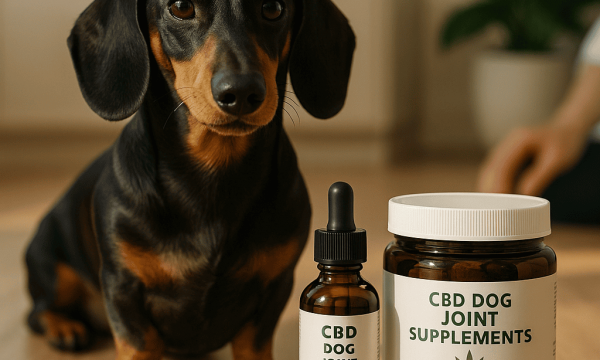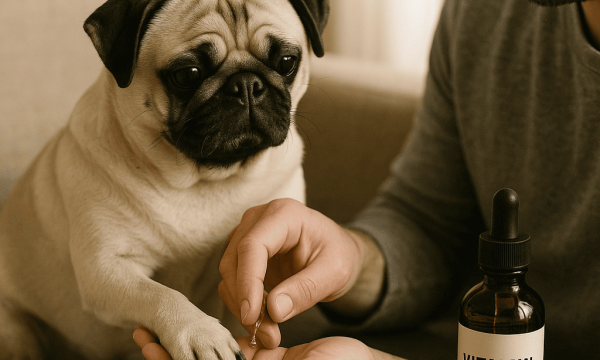Dog allergies can be frustrating for both pets and their owners. If your dog is constantly itching, licking their paws, or experiencing digestive upset, you may be searching for gentle ways to help. As a veterinarian, I often see the positive role that probiotics may play in managing allergies in dogs. While not a cure-all, the right probiotic can support your dog’s gut health and, in turn, help reduce allergy symptoms. Let’s explore how and why.
Understanding Dog Allergies and Gut Health
Common Dog Allergies and Symptoms
Dogs, much like people, can develop allergies to things in their environment, food, or even flea bites. The most common types of allergies in dogs include:
- Food allergies: Often caused by proteins like beef, chicken, or dairy.
- Environmental allergies: Such as pollen, dust mites, or mold.
- Contact allergies: Triggered by things like cleaning products or certain fabrics.
Symptoms of allergies in dogs may include:
- Persistent itching and scratching
- Red, inflamed skin or hot spots
- Licking or chewing paws
- Ear infections or shaking head
- Gastrointestinal upset (vomiting, diarrhea)
- Watery eyes or sneezing
If you notice these signs, it’s important to consult your veterinarian for a diagnosis.
Understanding Dog Allergies and Their Causes
An allergy is essentially an overreaction of your dog’s immune system to a harmless substance. Genetics play a significant role, but environment, diet, and even stress can be factors. In some dogs, allergies are seasonal, while for others, they’re a year-round struggle.
The Science Behind Probiotics and Immune Support
About 70% of your dog’s immune system resides in the gut. A healthy gut flora helps regulate immune responses and may help decrease the severity of allergic reactions. When the balance of good bacteria in the gut is disturbed—due to antibiotics, illness, or diet—your dog’s immune system can become more reactive.
Probiotics are live microorganisms (measured in CFU—colony-forming units) that can help restore this balance. While not every dog with allergies will benefit equally, supporting gut health is a cornerstone of allergy management.
Benefits of Probiotics for Dogs with Allergies
Benefits of Probiotics for Allergies
Probiotics may help your allergic dog in several ways:
- Modulating immune response: Probiotics can support immune cells, potentially reducing hypersensitivity.
- Improving skin barrier function: Some strains may help maintain healthy skin, reducing itching.
- Supporting digestive health: Many allergic dogs have concurrent gastrointestinal symptoms; probiotics can help restore balance.
- Outcompeting harmful bacteria: A balanced gut is less likely to be overrun by harmful pathogens.
Always remember that probiotics are supportive—not a replacement for veterinary treatment or prescribed medications.
Probiotic Strains That Alleviate Allergies
Not all probiotics are created equal. Strains most commonly used to support dogs with allergies include:
- Lactobacillus acidophilus
- Bifidobacterium animalis
- Enterococcus faecium
- Lactobacillus rhamnosus
Each strain offers unique benefits. For instance, Lactobacillus rhamnosus has shown promise in modulating allergic skin responses, while Bifidobacterium animalis can be beneficial for digestive comfort.
How to Choose the Best Probiotic for Your Dog

Key Features to Look for in Dog Probiotics
When choosing a probiotic for your dog, consider these factors:
- Strain specificity: Look for clearly listed strains (not just “probiotic blend”).
- CFU count: Effective products usually offer 1–10 billion CFU per serving.
- Formulation: Powder, chew, capsule—choose what’s easiest for you and your dog.
- Stability: Shelf-stable products ensure live bacteria at the time of use.
- Certification: Products meeting AAFCO (Association of American Feed Control Officials) and NASC (National Animal Supplement Council) standards are generally more reliable.
Key Ingredients in Dog Probiotics
Apart from the live strains, check for:
- Prebiotics: Fibers like inulin or FOS (fructooligosaccharides) feed good bacteria.
- No artificial fillers: Avoid added sugars, dyes, or unnecessary chemicals.
Selecting the Right Probiotic for Your Dog
Every dog is unique. Consider your dog’s:
- Size and weight: Follow label instructions (e.g., for a 50 lb/22.7 kg dog, adjust dosage accordingly).
- Allergy type: If your dog reacts to beef or chicken, avoid flavorings with those proteins.
- Form preference: Some dogs love chews, others may need powders mixed into food.
Natural Alternatives and Complementary Treatments
In addition to probiotics, you can support your dog’s allergy management by:
- Omega-3 fatty acids: May help decrease inflammation (from fish oil or flaxseed).
- Regular grooming: Reduces allergen load.
- Proper diet: Limited-ingredient or hypoallergenic diets may help.
- Other supplements: Prebiotics, digestive enzymes, or certain herbal blends (consult your vet first).
Top-Rated Probiotics for Dogs with Allergies in 2025
Below are some of the most reputable probiotics for dogs with allergies this year. All products listed are compliant with AAFCO and/or NASC recommendations at the time of writing. Always double-check product certifications, as formulations can change.
1. Purina FortiFlora Canine Probiotic Supplement
- CFU Count: 100 million CFU per packet
- Strain: Enterococcus faecium SF68
- Form: Powder (easy to sprinkle over food)
- Best for: Dogs with mild allergies or GI upset
- AAFCO/NASC: NASC quality seal; complies with AAFCO guidelines
What makes it stand out?
Extensively researched, palatable, and easy to administer. Many dogs with allergies tolerate it well.
2. Nutramax Proviable-DC Capsules
- CFU Count: 5 billion CFU per capsule
- Strains: Seven strains including Lactobacillus acidophilus, Enterococcus faecium, Bifidobacterium bifidum
- Form: Capsule (can be opened and mixed with food)
- Best for: Dogs with recurring GI issues and skin allergies
- AAFCO/NASC: NASC seal; meets AAFCO standards
What makes it stand out?
Multi-strain support for broader action, especially when allergies and digestive issues overlap.
3. Zesty Paws Probiotic Bites for Dogs
- CFU Count: 3 billion CFU per chew
- Strains: Six, including Bacillus subtilis and Lactobacillus plantarum
- Form: Soft chew (chicken or pumpkin flavor)
- Best for: Dogs who prefer treats, picky eaters
- AAFCO/NASC: NASC quality seal; AAFCO-compliant ingredients
What makes it stand out?
Dogs usually love the taste; contains added prebiotics and does not use artificial colors or flavors.
4. Pet Honesty Digestive Probiotics Soft Chews
- CFU Count: 6 billion CFU per chew
- Strains: Eight, including Lactobacillus casei and Bifidobacterium lactis
- Form: Soft chew (duck, chicken, or pumpkin flavors)
- Best for: Dogs with sensitive digestion and moderate allergies
- AAFCO/NASC: NASC certified
What makes it stand out?
Comprehensive strain profile and all-natural flavorings—great for dogs with dietary sensitivities.
Note:
Always introduce a new supplement gradually and monitor for adverse reactions. If your dog has a history of severe allergies, especially to food, discuss any product changes with your veterinarian.
How to Administer Probiotics to Dogs

Tips for Administering Probiotics to Your Dog
- Follow label directions based on your dog’s weight (e.g., a chew for 30 lbs/13.6 kg versus 75 lbs/34 kg).
- Start with a lower dose for the first few days to watch for sensitivity.
- Mix powders or capsules with a small amount of favorite food to ensure full consumption.
- Offer chews as treats, but account for any flavor allergens.
Step-by-Step Guide to Introducing Probiotics
- Consult your veterinarian before beginning.
- Start gradually: Give half the recommended dose for the first 2–3 days.
- Observe your dog: Look for changes in stool consistency, energy, and allergy symptoms.
- Increase to full dose if no adverse effects.
- Continue daily administration for at least 4–8 weeks to assess benefit.
Best Practices for Ensuring Effectiveness
- Store properly: Some probiotics need refrigeration; others are shelf-stable.
- Consistency matters: Administer at the same time each day for best results.
- Avoid antibiotics at the same time: Separate probiotic and antibiotic doses by several hours.
FAQs about Dog Probiotics and Allergies
Can Probiotics Help All Dogs with Allergies?
Not every dog will benefit equally from probiotics. While many owners report positive changes, and research is promising, probiotics are best seen as a supportive measure. They may not replace allergy medications or other therapies, but can be a valuable part of a holistic approach.
Are There Any Side Effects?
Most dogs tolerate probiotics very well. Occasionally, mild digestive upset (loose stool or gas) may occur when first starting. This typically resolves within a few days.
How Long Before I See Results?
Some dogs show improvement in 1–2 weeks, but for others, it may take up to 2 months of consistent use.
Can I Give Human Probiotics to My Dog?
It’s best to choose probiotics specifically formulated for dogs, as canine strains and dosages are tailored for their needs.
Should I Stop Probiotics If My Dog Takes Antibiotics?
Probiotics can support gut health during antibiotic treatment, but space them several hours apart. Always consult your veterinarian for guidance.
Final Thoughts
Managing allergies in dogs often requires patience and a combination of strategies. While probiotics may help support your dog’s gut health and immune balance, they’re just one piece of the puzzle. The best results come from working closely with your veterinarian to identify allergens, address diet, and create a comprehensive care plan. Remember: Every dog is unique, and what works for one may not work for another.
Always consult your veterinarian before starting any new supplement. Probiotics are not a cure, but they can be a gentle and effective addition to your dog’s allergy management toolbox.




